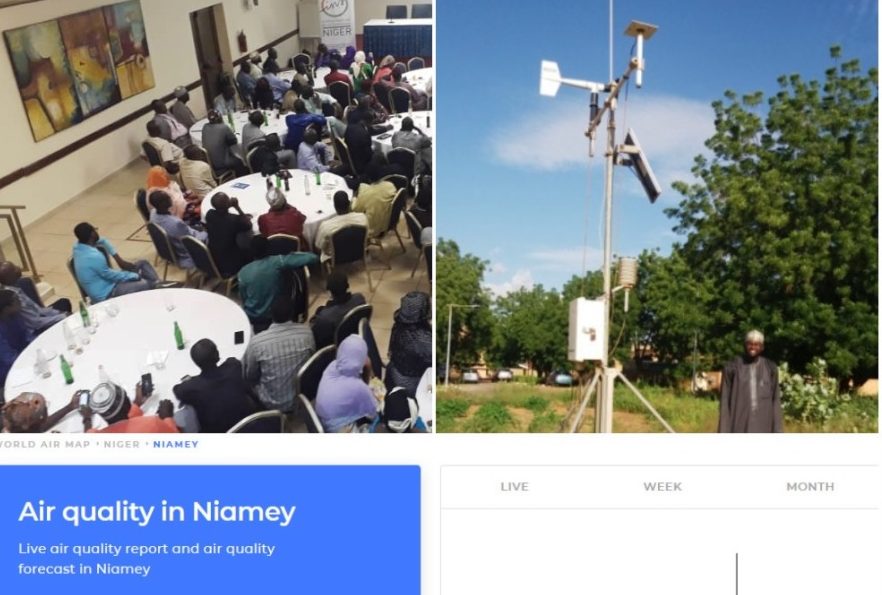
The 2019-20 GYA North-South Interdisciplinary Grant was awarded to Ibrahim Sidi Zakari (Niger), Robert Lepenies (Germany) and Lisa Herzog (Germany) for the research project: Citizen science for reducing exposure to urban air pollution.
The overall goal of this project is to investigate the potential of citizen science to advance air pollution-related Sustainable Development Goals (SDGs) in Niger and Germany in a way that is at the same time concrete, ethically informed and collaborative, in order to be effective.
About the GYA North-South Interdisciplinary Grant
The GYA includes a diverse membership of scientists and scholars, in many disciplines, based in low/middle-income and high-income countries. This grant scheme was initiated in 2014, aiming to foster collaboration across the lines that often separate researchers and limit possibilities. Specifically, this scheme facilitates the development of small-scale, innovative, curiosity-driven, blue-sky, exploratory research pilots or prototypes that unite researchers in low/middle-income and high-income countries and cross disciplinary boundaries.
The North-South Interdisciplinary Grant is awarded annually, and is meant to provide seed money to enable GYA members to prepare a proof of concept, prototype, or pilot research project with a view to securing larger external funding.
N/A
Clean air is an important policy goal around the world: in Europe, it is the most important environmental cause of premature death[1]. From 1990 to 2016, Niger registered the highest average annual population-weighted Particulate Matter PM2.5 (µg/m3) and higher number of deaths attributable to PM2.5 (µg/m3) than any other country of the African Union[2].
As part of Agenda 2030, the importance of clean air has been enshrined in Target 11.6 which aims “by 2030, [to] reduce the adverse per capita environmental impact of cities, including by paying special attention to air quality […]” [3].
In order to effectively achieve this target, all countries will need to provide high-quality, timely and accessible data, often in areas where very little data exists today, complementing official data sources and statistics. Citizen science has been heralded as particularly promising here. It has also been lauded for its potential to make scientific engagement more widely accessible, and to help generate trust in science. However, it obviously cannot be applied in a one-size-fits-all approach, but needs to be adapted to different social and cultural contexts. This interdisciplinary project aims to start a pilot citizen science project for implementing the SDGs, which is:
[1] https://www.eea.europa.eu/highlights/air-pollution-still-too-high
[2] https://www.stateofglobalair.org/
[3] https://unstats.un.org/sdgs/metadata?Text=&Goal=11&Target=11.6
[4] Annual mean levels of fine particulate matter (e.g. PM2.5 and PM10) in cities (population weighted)
An article co-authored by Lisa Herzog and Robert Lepenies on “Citizen Science in Deliberative Systems: Participation, Epistemic Injustice, and Civic Empowerment” was published in Minerva (DOI: 10.1007/s11024-022-09467-8).
In December 2019, Ibrahim Sidi Zakari was a visiting scholar at the Helmholtz Centre for Environmental Research (UFZ) in Germany, where he collaborated with Robert Lepenies and Lisa Herzog as well as with local researchers in the field of environmental politics, statistical modeling and urban sociology. The team worked on the problem of air pollution, its impact on health, recruitment of volunteers for crowdsourcing activities as well as the optimal sample size. They also addressed practical and ethical questions related to data collection, validation, processing of data from citizen science initiatives and their management, and reached out to open source platforms. With the acquisition of 6 latest generation flow 2 type pollution sensors capable of measuring ultrafine particles, the team was able to do tests locally for short term model testing.
In a spin-off project, the grant work also led to the integration of crowdsourced data on cooking technologies and fuels into mobile and web apps (ENERGY TSAPP) for promoting clean cooking.
In addition to collaborative research, the team also focused on outreach: presenting on the topic at conferences and in papers, and connecting to organizations in Europea and Africa (for example, World Wide Generation to explore possible collaboration on SDG reporting). Due to current pandemic travel and contact restrictions, planned workshops on citizen science in Niger and Germany were put on-hold. The group also linked to and attended meetings of the EU funded project https://www.weobserve.eu/about/.
Publications:
Lepenies, R.; Zakari, I.S. Citizen Science for Transformative Air Quality Policy in Germany and Niger. Sustainability 2021, 13, 3973. https://doi.org/10.3390/su13073973